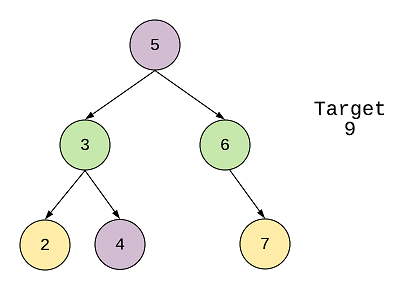Two Sum IV - Input is a BST Solution - Leetcode
Leetcode Solution: Understand and solve Leetcode problem Two Sum IV - Input is a BST Solution(653)
In this article, we’ll be solving the problem: Two Sum IV - Input is a BST. Just like the problems, Univalued Binary Tree and Leaf Similar Trees this problem belongs to Tree Traversal and Recursion category.
Given a Binary Search Tree and a target number, return true if there exist two elements in the BST
such that their sum is equal to the given target.
Example 1:
Input:
5
/ \
3 6
/ \ \
2 4 7
Target = 9
Output: True
Example 2:
Input:
5
/ \
3 6
/ \ \
2 4 7
Target = 28
Output: False
To solve this problem, we’ve to find a pair of numbers whose sum is equal to target. As the provided tree is binary search tree. We can check if an element exists in the tree in log2 N time complexity.

So, the first solution that we’ll look into we’ll be based on that. In this solution, we’ll
- Traverse through the BST
- For every node, I’ll check if the element target - node.Value exists.
- If it exists then I’ll return true
- If it doesn’t then I’ll move to the next node and repeat the same process
Here is the code for that:
type TreeNode struct {
Val int
Left *TreeNode
Right *TreeNode
}
func findTarget(root *TreeNode, k int) bool {
theRoot := root
return preOrder(root, theRoot, k)
}
func preOrder(node, theRoot *TreeNode, k int) bool {
if node == nil {
return false
}
if (binarySearch(theRoot, node, k - node.Val)) {
return true
}
return preOrder(node.Left, theRoot, k) || preOrder(node.Right, theRoot, k)
}
func binarySearch(root, nodeToIgnore *TreeNode, k int) bool {
if root == nil {
return false
}
if root.Val == k && root != nodeToIgnore {
return true
} else if root.Val > k {
return binarySearch(root.Left, nodeToIgnore, k)
} else {
return binarySearch(root.Right, nodeToIgnore, k)
}
}
In this approach, I’ve not used extra space and due to that the time complexity is O(n log2 n). If we keep the values encountered during pre order traversal in a set then we won’t have to do the binary search for every node as we’ll be looking to the map this time.
type TreeNode struct {
Val int
Left *TreeNode
Right *TreeNode
}
var elementMap map[int]bool = make(map[int]bool)
func findTarget(root *TreeNode, k int) bool {
if root == nil {
return false
}
if _, ok := elementMap[k - root.Val]; ok {
return true
}
elementMap[root.Val] = true
return findTarget(root.Left, k) || findTarget(root.Right, k);
}
This time the time complexity is O(N), but the extra space complexity is O(N) as well.
This program is available here @ GitHub as well

Related Pages:
- All Elements in Two Binary Search Trees Solution
- Construct Binary Search Tree From Preorder Traversal Solution
- Maximum Binary Tree Solution
- Sum of Nodes With Even Valued Grandparent Solution
- Deepest Leaves Sum Solution
- Symmetric Tree or Mirror Tree Solution
- Diameter of Binary Tree Solution
- Binary Tree Paths Solution
- Cousins in Binary Tree Solution
- Sum of Left Leaves Solution
- Same Tree or Equal Tree Solution
- Minimum Absolute Difference in BST Solution
- Construct String From Binary Tree Solution - Leetcode
- Two Sum IV - Input is a BST Solution - Leetcode
- Convert BST to Greater Tree Solution - Leetcode
- Convert Sorted Array to Binary Search Tree Solution
- Average of Levels in Binary Tree Solution
- Leaf Similar Trees Solution - Leetcode
- Sum of Root to Leaf Binary Numbers - Leetcode
- Univalued Binary Tree - Leetcode
- Maximum Depth of N Ary Tree - Leetcode
- Increasing Order Search Tree - Leetcode
- Merge Two Binary Trees Solution
- Range Sum of BST - Leetcode